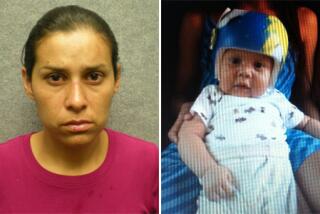Gov. Jerry Brown weighs clemency petition for a grandmother
Gov. Jerry Brown is giving strong consideration to a clemency petition for a grandmother whose conviction for shaking her infant grandson to death was overturned by an appeals court and reinstated by the U.S. Supreme Court, lawyers close to the case said.
The governor, who received the petition Wednesday, is being asked to commute the life sentence of Shirley Ree Smith, a 51-year-old grandmother who was sentenced to 15 years to life in 1997 for causing the death of a child.
Although Brown is notoriously unpredictable, a longtime advisor said he would be “very surprised” if Brown did not grant clemency to Smith, who has spent 10 years in prison for a death she has maintained was a tragic case of Sudden Infant Death Syndrome, not a crime against a beloved child.
A federal appeals court found “no demonstrable support” for the prosecution’s claim that Smith shook 7-week-old Etzel Glass to death in 1996 and granted her release from prison in 2006 after striking her conviction by a Van Nuys jury.
But the U.S. Supreme Court in October reinstated the conviction on the grounds that courts should not second-guess verdicts “supported by the record.”
The high court admitted that doubts about Smith’s guilt were “understandable,” and three justices penned a dissent criticizing the majority in the 6-3 decision for intervening to assert a procedural point.
A growing number of medical experts have questioned the science behind so-called “shaken baby” cases, especially those decided in decades past. Smith’s trial took place only weeks after the headline-grabbing case of British nanny Louise Woodward brought the fatal act of child abuse to the nation’s attention.
Clemency petitions are generally futile, granted mostly when governors are leaving office. But Smith’s case so concerned some federal judges that they privately reached out to ensure that the petition got Brown’s close attention, lawyers said.
Three weeks ago, a clerk from the 9th Circuit called Michael Brennan, Smith’s attorney, asking if he was going to file a clemency petition.
Brennan said he told her he would but considered it futile.
“All the clerk said was, ‘You might be mistaken. A petition might be well received,’ ” Brennan said. “Clearly, she was sort of saying, ‘File the petition.’ ”
Smith, reached at her home in Kankakee, Ill, said she has been living on tenterhooks waiting for word on whether she must go back to prison to serve the remainder of her sentence.
“I’ve been trying to find someone who can explain to me what’s going on,” said Smith, who was hoping to follow her daughter to Minnesota so she could continue babysitting her younger grandchildren. “The lawyers keep saying this isn’t about me, it’s about the courts and the law on decisions. But how can it not be about me when I’m the one who may have to go back to prison?”
In the fall of 1996, Smith moved to Van Nuys from Illinois to help her daughter Tomeka care for newborn Etzel, 14-month-old Yondale and 3-year-old Yolanda. On the night of Etzel’s death, Smith was sleeping in the living room of her sister’s apartment with the three grandchildren. When she got up to use the bathroom, she found him lifeless and summoned paramedics. An emergency room physician listed the cause of death as SIDS.
An autopsy revealed a small pool of blood on the baby’s brain, which two officials in the medical examiner’s office testified at Smith’s trial was the result of violent shaking. Neither defense expert testimony that the baby probably died of SIDS nor Tomeka’s assertions that her mother had never raised a hand against her or her children dissuaded jurors from the prosecution’s theory that Smith had become irritated by the infant’s crying and shook him to make him stop.
Smith’s clemency petition relies heavily on a dissent written by Justice Ruth Bader Ginsburg and signed by Justices Stephen Breyer and Sonia Sotomayor.
Ginsburg wrote that what “is now known about shaken baby syndrome (SBS) casts grave doubt on the charge leveled against Smith; and uncontradicted evidence shows that she poses no danger whatsoever to her family or anyone else in society.”
More to Read
Start your day right
Sign up for Essential California for news, features and recommendations from the L.A. Times and beyond in your inbox six days a week.
You may occasionally receive promotional content from the Los Angeles Times.






